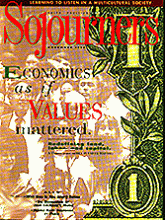Ninety vehicles--including pick-up trucks, an ambulance, cars, and a school bus--set out this summer to deliver food, medicine, and other supplies to Cuba, in intentional violation of the U.S. embargo. Eighty-nine of the vehicles were allowed to cross into Mexico. The last one, a yellow school bus intended for Havana's Ebenezer Baptist Church, was stopped at the border by U.S. Customs agents.
The driver of the bus--Rev. Lucius Walker, a Baptist minister and founder of Pastors for Peace--and its 13 passengers began a hunger strike, which finally ended 23 days later when the Treasury Department declared the bus to be humanitarian aid instead of illegal export. During the fast, supporters demonstrated in 40 cities and four countries to demand the release of the bus and an end to the economic blockade of Cuba.
"Aside from the situation in Cuba, our main subject of discussion for the past three weeks has been food," said Abe Golokov, an 86-year-old hunger striker from San Diego. "I can't wait to eat my first potato knish."
Pastors for Peace, which sponsored the caravan, is organizing a construction brigade in November to build houses in a Havana barrio and another humanitarian caravan in early 1994. Walker condemned the embargo for the suffering caused to the Cuban people, and said, "As Christians and people of conscience, we cannot participate in any aspect of such a policy."
Jim Rice is editor of Sojourners. Jill Lafferty assisted with research.
Read the Full Article

